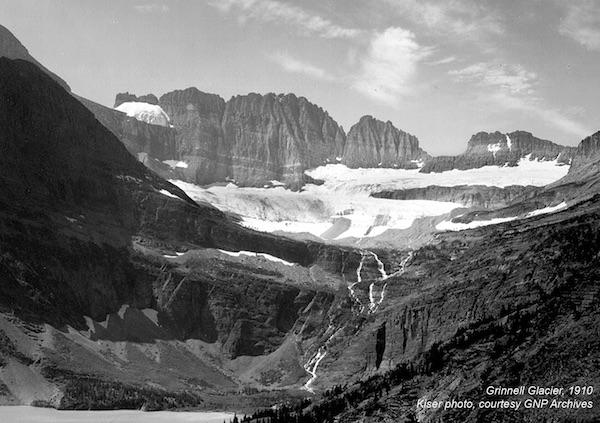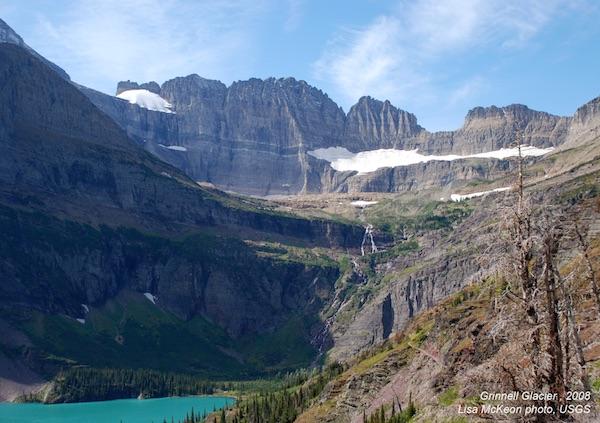
Grinnell Glacier in 1910/Fred Kiser photo, courtesy of Glacier National Park Archives
With the possibility that Glacier National Park will be glacierless by as soon as 2020, are you moving up your plans to visit the park?
That seems a reasonable question, both in light of recent weather patterns, warming temperatures, and the ability to glimpse a glacier upclose without traveling to Alaska. Not too many years ago scientists were predicting that Glacier's glaciers would be meltwater by 2030. But now they're moving the date up, to around 2020, due to the heightened pace of warming.
According to a story that ran on National Geographic's website in September 2013, "Since 1900, the mean annual temperature in Glacier National Park has increased by 2.4 degrees Fahrenheit (1.3 degrees Celsius)'1.8 times the global mean increase. Snowmelt is occurring up to a month earlier, and more precipitation is falling as rain rather than snow." And while one year does not make a trend make, snowfall this winter is running behind in Glacier, as is the snow water equivalent in that snowpack.
So, with the possibility that the park's glaciers will vanish in another five years, are you thinking of moving up your trip to Glacier?

Grinnell Glacier in 2008./Lisa McKeon photo, USGS



Comments
Sorry Lee - I don't buy into that fatalistic, zero sum negativity.
A bit of shameless promotion, if I may. Ten years ago, I wrote a book entitled ALLIES OF THE EARTH: RAILROADS AND THE SOUL OF PRESERVATION. It was all about a wonderful technology that we had and threw away. Well, not quite. We still use railroads to carry oil, coal, gravel, grain, and manufactured goods. But we no longer use them much to carry We the People. If we are going to wring our hands again about climate change, how about we think of SOLUTIONS. Mine is railroads for all of that "biomass" we humans now compose.
Bookshelves are full of authors pointing out "The Problem." On that, there are creative "insights" galore. But we already know the problem, don't we? We keep hoping for something "new" that will save us by still allowing us to consume--and grow. It's not in the cards, so we stack the deck again, in this case, by pretending that the "new" book says it all. It has a new term but still an ancient thesis: "We have met the enemy, and he is us."
Next time, take the train. And I dare you to enjoy it. There is even one to Glacier National Park so you can see the melting glaciers. And they won't stop melting if we keep using cars and airplanes. Now, if I can't get Al Gore out of his private jet--or Lincoln Town Car--what chance do I have with you?
Right, Alfred. We have squandered many opportunities. Passenger railroads are just one of many. When Utah was preparing to build the Frontrunner rail line between Ogden on the North and Provo on the south, there was tremendous hue and cry from those who opposed it. Not any more. Now I can make a round trip from here to the city by the saline puddle for a whopping $4.75 (senior rate). I'll be riding part of the Alaska Railway this summer.
I'm not wringing my hands uselessly. And I don't believe it is hopeless. Not yet, at least. We still have time to salvage things. But only if we get to work.
I'm trying very hard to reduce the footprint of my small hunk of biomass. I don't claim to know all the answers, but I do think we should be making a very real effort to learn what they are instead of wrangling endlessly over what they may or may not be.
As for this book, she does offer solutions -- at least what she thinks some solutions might be. But if none of the people who post endlessly here read it, they will never know what she suggests. They will never know if they just might, maybe, perhaps actually agree with some of what she offers. One of her most important points is exactly what you allude to, Dr. Runte -- the hope that something "new" will somehow save us from ourselves without requiring any sacrifice from anyone.
That was the point of my first post here.
Al Gore is a fool. But constantly using him as an excuse not to seek answers to serious problems is a foolish cop-out.
Again, I ask, shall we be satisfied to sit and do nothing more than argue with one another while we continue to foul the only nest we have?
I'm sorry, but anyone who believes that we intelligent apes are not fouling our nest must be deliberately blind.
Thanks, Lee. I do believe, and see evidence all around me, that those who refuse to acknowledge this reality are those who are apologists for the industries and individuals who add to the destructive momentum. It is good to identify them.
Or perhaps they have more vision than you.
Well, we're once again pretty far afield from the subject of this story, which was whether predictions of shrinking glaciers will affect your plans (or timing) to visit Glacier NP. That said, ec's bait points out that various posters on this site has a different "vision" about the future of the planet- and that suggests a different perception about where we are now, and have been in the past - in terms of things like use of resources.
ec says some have "more vision" than some others in that regard (and implies that he's in that camp), so it would be interesting to hear what that might be in terms of how we should use the resources of the planet.
Agreed, JT. It would be very interesting to hear something more than the usual dodges from the dodger. But it won't happen.
As for the question of whether the lack of glaciers in Glacier would prevent me from visiting, the answer is a big NO. But at the same time, a visit to a glacierless Glacier would be like attending the funeral of a good friend albeit in a beautiful place. On my last trip, I hiked very familiar trails into a totally unfamiliar landscape. It was a strangely emotional experience and not a happy one. It was as if there was a permanently vacant chair at a family dinner.
I'd be very interested in hearing from others what they are doing to try to reduce their own deposits of waste into our spherical nest. We intelligent apes face an incredibly difficult challenge, the outcome of which will determine if our species continues in dominance or diminishes toward eventual extinction. Are we intelligent enough to save ourselves?
I'm an optimist. I believe we are. But only if we choose to do so.
Now from ec and others of his band of doubtful dominate primates, may we hopeful primates hear their answers to a vital question: Where should we start? Please share your greater vision with us.
We should "start" by continuing to innovate and advance. You Debbie Downers are always predicting the worst, looking at the world, economy, money... as finite. You don't have the vision to see how man has constantly improved his well being and will continue to do so in the future. Today we live healthier, longer and with the best standard of living ever and the future holds that in the future that will only improve. No, I don't see the fouling you are so concerned will lead to our extinction.